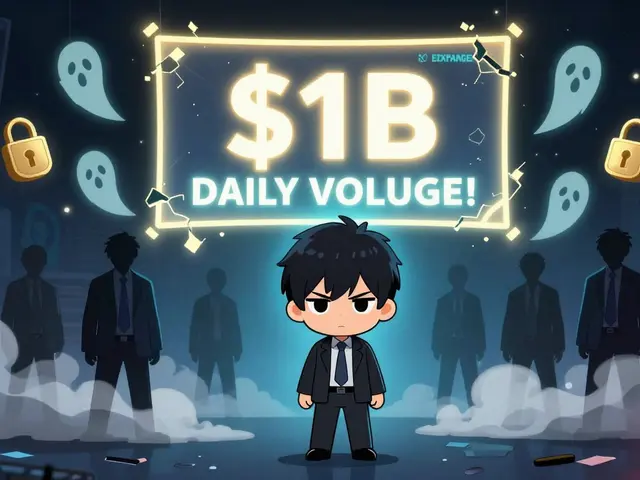Myanmar Crypto Policy Comparison Tool
Myanmar's Directive 9/2020
Complete ban on cryptocurrency transactions with severe penalties including account freezes, fines, and imprisonment.
Regulatory Alternatives
Countries like Thailand, Singapore, and Malaysia regulate crypto with licensing and oversight mechanisms.
Key Features:
Myanmar crypto ban has reshaped how citizens access digital money, but the story behind it is more than a headline. In May 2020 the Central Bank of Myanmar issued Directive9/2020, a sweeping prohibition that bars anyone in the country from buying, selling, or exchanging unregulated cryptocurrencies. This article unpacks what the directive actually says, how it’s enforced, why it matters for everyday users, and what the future might hold.
What Directive9/2020 Actually Says
On 15May2020 the Central Bank of Myanmar the nation’s monetary authority, empowered by the Central Bank of Myanmar Law (Sections40(e) and62) released Directive9/2020. In plain language, the notice forbids all residents from:
- Purchasing any cryptocurrency, including Bitcoin (BTC), Ethereum (ETH), Litecoin (LTC) and Perfect Money (PM).
- Selling or exchanging these digital assets for the local kyat or any foreign currency.
- Using personal Facebook pages or accounts to promote or facilitate crypto transactions.
The directive makes it clear that digital currencies are "not legal tender" and that no financial institution may assist with any related activity. It leans on three existing statutes - the Foreign Exchange Management Law regulates cross‑border currency flows, the Financial Institutions Law governs banks and licensed financial entities, and the Anti‑Money Laundering Law targets illicit financing and money‑laundering activities. Together they give the Central Bank a legal footing to treat crypto dealings as illegal currency conversion.
Enforcement Mechanisms and Penalties
In its first year the CBM warned that violations could lead to bank account closures, fines, or imprisonment. Enforcement stepped up in May2024 when the bank issued a second notice, explicitly stating that it would freeze accounts and pursue criminal charges under the three laws mentioned above. Real‑world cases have followed:
- Individuals caught converting Tether (USDT) via informal hundi networks faced account freezes.
- Two traders were sentenced to six months’ imprisonment for using Telegram to arrange peer‑to‑peer Bitcoin sales.
- Several Facebook pages promoting crypto exchanges were shut down, and the admins were served legal summons.
Penalties vary, but the law allows both monetary fines (up to 5millionkyat) and custodial sentences up to three years, depending on the perceived severity and whether the activity involved large‑scale money‑laundering.
Why the Ban Is Different From Its Neighbours
Most Southeast Asian countries have opted for regulation rather than outright prohibition. Thailand, Singapore and Malaysia have licensing regimes that let exchanges operate under supervision. Myanmar’s stance is starkly more restrictive. The table below highlights the contrast.
| Country | Legal Status of Crypto | Key Legislation | Enforcement Approach |
|---|---|---|---|
| Myanmar | Complete Ban (Directive9/2020) | Central Bank Directive 9/2020, AML Law, Financial Institutions Law | Account freezes, criminal prosecution, social‑media crackdown |
| Thailand | Regulated - licensing required | Digital Asset Business Act 2022 | Licensing, AML monitoring, periodic audits |
| Singapore | Regulated - payment services act | Payment Services Act 2020 | Licensing, compliance reporting, fines for breaches |
| ElSalvador | Bitcoin legal tender | Bitcoin Law 2021 | State‑run wallet, tax incentives, enforcement via tax authority |

Underground Crypto Activity: How People Keep Trading
Even with a hard‑line ban, crypto didn’t vanish. From 2023‑2025 an informal economy grew, driven by a collapsing kyat and the need for cross‑border remittances. Key characteristics include:
- Peer‑to‑peer platforms: Telegram groups act as virtual marketplaces, matching buyers and sellers without a central exchange.
- Stablecoins dominate: USDT on the Tron network is the preferred token because its dollar peg insulates users from local inflation.
- Off‑shore exchanges: Residents use VPNs to access services based in Malaysia, India or the EU, then move USDT through local agents.
- Cash‑in/out points: Small shops for a fee will convert cash to USDT and vice‑versa, often under the radar of the Financial Institutions Law.
These channels are fragile. Internet shutdowns, especially after the 2021 coup, can cripple Telegram traffic for days, prompting users to rely on SMS‑based brokers or even physical couriers carrying hardware wallets.
The Political Twist: NUG vs. Military Government
After the February2021 coup, the opposition National Unity Government (NUG) declared Tether (USDT) legal tender in the areas it controls. This move directly challenged the military‑run State Administration Council (SAC), which in January2022 drafted a cybersecurity law criminalising crypto use. The clash creates a dual‑policy environment:
- NUG strategy: Introduce a home‑grown token called Digital Myanmar Kyats (DMMK) and launch a mobile wallet for citizens under its jurisdiction.
- SAC response: Tighten digital surveillance, shut down Facebook pages linked to crypto, and threaten harsher prison terms.
For the average user, the reality is a confusing patchwork of conflicting rules, which fuels the reliance on anonymised channels.
Future Outlook: Will the Ban Hold?
Three forces will shape the next chapter:
- Economic pressure: The kyat’s continued depreciation makes digital assets an attractive store of value, pressure that could force the CBM to soften its stance.
- International influence: Regional bodies like ASEAN are pushing for harmonised crypto regulations. Myanmar might eventually adopt a licensing regime to align with neighbours.
- Political resolution: A negotiated settlement between the NUG and the SAC could either institutionalise crypto through a joint framework or cement the ban as part of a broader crackdown.
For now, the CBM’s position remains unchanged, but the underground market’s resilience suggests that any future policy will need to address not just legal texts but also the practical ways people move value across borders.
Key Takeaways
- Directive9/2020 bans all cryptocurrency transactions and imposes severe penalties.
- Enforcement focuses on bank accounts, social‑media platforms, and criminal prosecution under AML, Financial Institutions, and Foreign Exchange laws.
- Myanmar’s approach is among the strictest in Southeast Asia, contrasting with regulated frameworks elsewhere.
- Despite the ban, a vibrant P2P and stable‑coin ecosystem thrives, relying on Telegram, VPNs, and local cash‑in/out points.
- The political divide between the NUG and the SAC creates a dual policy environment that could reshape the crypto landscape.

Frequently Asked Questions
Is it illegal to own Bitcoin in Myanmar?
Yes. Directive9/2020 explicitly bars residents from buying, selling, or holding Bitcoin or any other unregulated cryptocurrency. Possession can be considered a violation of the Anti‑Money Laundering Law if it involves transfer or exchange.
What penalties could I face for trading USDT?
Trading USDT falls under the same ban. Penalties may include freezing of bank accounts, fines up to 5millionkyat, and imprisonment of up to three years, especially if the activity is linked to money‑laundering.
Can I use a VPN to access foreign crypto exchanges?
Technically you can, but the CBM monitors VPN traffic and may still pursue legal action if they trace transactions to a Myanmar resident. Risk remains high.
What is the NUG’s Digital Myanmar Kyats (DMMK) plan?
The NUG intends to issue a sovereign digital token, DMMK, backed by a mobile wallet that would operate in territories it controls. It aims to provide an alternative to the military‑run kyat and the CBM’s crypto ban.
Will the ban likely change in the next few years?
Economic strain and international pressure could push the CBM toward a moderated stance, possibly introducing a licensing regime. However, any shift depends on political stability and whether the NUG gains broader recognition.




Elmer Detres
August 28, 2025 AT 05:13Wow, the Myanmar crypto ban really shows how regulators can swing from open‑door to locked‑gate overnight 😲. The penalties are brutal, but the underlying fear of capital flight makes sense given the kyat's slide. Still, it’s crazy that they target Facebook pages – the internet is a wild frontier now. People will find workarounds, no matter how tight the net is. Stay sharp, stay safe, and keep an eye on those underground Telegram groups 🚀.
Tony Young
August 28, 2025 AT 06:53Imagine the drama of a whole nation being forced to shove its crypto dreams into the shadows! 😱 The Directive reads like a thriller novel – freeze accounts, lock wallets, toss you in jail for a few years. It’s a classic case of fear‑based policy, and history tells us that repression only fuels the underground market. If you think the ban will stop Tether, think again – people will always find a way. Brace yourselves, the crypto underworld is about to get even wilder! :)
Fiona Padrutt
August 28, 2025 AT 08:33Myanmar's leadership is protecting its sovereignty by crushing crypto – a bold move that sends a message to outsiders. No foreign meddling through digital assets, no more money laundering. This is the kind of patriotic stance we need to keep the nation safe.
Briana Holtsnider
August 28, 2025 AT 10:13Honestly, this ban is a textbook example of overreach. They claim it's about AML, but it feels like a power grab to control any financial autonomy. The punitive fines and prison terms are disproportionate to any real risk. It's just another way to choke dissent and tighten the regime's grip.
Corrie Moxon
August 28, 2025 AT 11:53Hey folks, I get the fear behind the ban, but there’s a silver lining – it pushes people to get innovative. Those underground groups will come up with safer ways to transact, and eventually the government might have to reconsider. Stay hopeful and keep sharing knowledge responsibly.
Jeff Carson
August 28, 2025 AT 13:33From a cultural perspective, the clampdown highlights how financial tools intersect with identity. While the law is strict, the resilience of the community shows that economic autonomy is a core value. Traditional exchange methods coexist with digital attempts, creating a hybrid ecosystem that’s fascinating to observe.
Anne Zaya
August 28, 2025 AT 15:13That ban feels like an old‑school move in a modern world. People are clever, they’ll just find workarounds, no doubt.
Emma Szabo
August 28, 2025 AT 16:53What a vivid contrast between the iron fist of the Central Bank and the colorful tapestry of everyday Myanmarers navigating financial freedom! The ban is a stark reminder that policy can’t smother ingenuity – folks will keep weaving crypto threads into their daily lives, using Telegram, VPNs, and a dash of daring. Let’s keep the conversation alive and celebrate the resilience of those who refuse to be boxed in.
Fiona Lam
August 28, 2025 AT 18:33This is absolutely ridiculous – a total ban is the dumbest way to handle a technology that’s clearly here to stay. If they think they can stop crypto, they’re living in a fantasy. Let the market decide, not the heavy‑handed government.
OLAOLUWAPO SANDA
August 28, 2025 AT 20:13People always argue about bans, but really, why bother? If you’re not using crypto, you’re missing out on real opportunities. The government’s fear is just a cover for their own loss of control. Simple as that.
Alex Yepes
August 28, 2025 AT 21:53The Myanmar situation offers a poignant case study in how authoritarian monetary policy can clash with emerging financial technologies. First, the Directive 9/2020 explicitly declares cryptocurrencies illegal, anchoring its authority in three pre‑existing statutes: the Foreign Exchange Management Law, the Financial Institutions Law, and the Anti‑Money Laundering Law. Second, the enforcement mechanisms are unusually severe, ranging from account freezes to imprisonment of up to three years, with fines up to five million kyat. Third, the ban’s practical impact has not eradicated crypto activity; instead, it has driven it underground, fostering a resilient peer‑to‑peer ecosystem built on Telegram, VPN‑proxied exchanges, and cash‑in/cash‑out points operated by local merchants. Fourth, this subterranean market primarily revolves around stablecoins, especially USDT on the Tron network, due to its price stability against the faltering kyat. Fifth, the political bifurcation between the military‑run State Administration Council and the opposition National Unity Government has created a dual‑policy environment, with the NUG even declaring Tether as legal tender in its controlled territories. Sixth, this contradiction fuels confusion among citizens, prompting many to seek anonymity through hardware wallets and off‑shore services. Seventh, the macro‑economic pressure of a depreciating kyat continues to push citizens toward alternative stores of value, increasing the incentive to circumvent the ban. Eighth, regional bodies such as ASEAN are advocating for harmonised regulatory frameworks, which may eventually pressure Myanmar to adopt a more measured licensing regime. Ninth, the long‑term viability of the ban depends heavily on political stability; any negotiated settlement could either soften the policy or entrench it further as part of broader digital authoritarian controls. Tenth, from a compliance standpoint, institutions operating within Myanmar face heightened scrutiny, requiring robust KYC procedures even for non‑crypto services. Eleventh, the ban’s chilling effect on fintech innovation cannot be overstated, as startups are deterred from exploring blockchain‑based solutions. Twelfth, the social media crackdown, especially on Facebook, demonstrates a willingness to police digital discourse aggressively. Thirteenth, despite these hurdles, the underground crypto community remains remarkably adaptable, leveraging low‑tech methods like SMS brokers when internet access is throttled. Fourteenth, there is a growing call among diaspora and international investors for clearer guidance, as the opaque legal environment hampers legitimate cross‑border remittances. Fifteenth, ultimately, the interplay between authoritarian financial control and decentralized technology will shape Myanmar’s economic trajectory for years to come.
Sumedha Nag
August 28, 2025 AT 23:33Honestly, I think the whole thing is just a power play. People will keep using crypto no matter what, especially when the local currency is losing value. It’s like trying to stop water with a sieve.
Holly Harrar
August 29, 2025 AT 01:13Yo, if u wanna avoid any trouble, best to stay off the official banks and use those local cash‑in points. It’s kinda risky but it works for most ppl.
Vijay Kumar
August 29, 2025 AT 02:53From a mixed‑formality viewpoint, the underground crypto scene in Myanmar illustrates how technology adapts to regulatory pressure. While the ban is strict, the community’s energetic response showcases a blend of traditional barter methods and modern digital tools, creating a unique hybrid economy.
Edgardo Rodriguez
August 29, 2025 AT 04:33Indeed, the Central Bank’s Directive, by invoking the three core statutes-Foreign Exchange Management Law, Financial Institutions Law, and Anti‑Money Laundering Law-creates a formidable legal scaffold, which, in turn, empowers the enforcement apparatus to impose account freezes, levy substantial fines, and pursue custodial sentences; nevertheless, the persistence of peer‑to‑peer networks, facilitated by encrypted messaging platforms, underscores the resilience of decentralized finance, despite the overarching regulatory crackdown.
mudassir khan
August 29, 2025 AT 06:13While the optimism in the first comment is noted, the reality remains that such draconian measures only exacerbate the risk landscape. The legal framework, though comprehensive, does not account for the agility of crypto operators who can simply migrate to offshore services. Over‑punctuation aside, the ban is more of a symbolic gesture than an effective barrier.
Bianca Giagante
August 29, 2025 AT 07:53I appreciate the dramatic flair, yet it’s essential to balance passion with perspective. The ban certainly impacts legitimate users, but it also deters illicit activity-something that cannot be ignored. A measured approach may serve both security and innovation.
Andrew Else
August 29, 2025 AT 09:33Oh great, another patriotic rant about the ban. As if Myanmar needs more propaganda. The underground market will keep humming, regardless of the boss’s tantrums.
Susan Brindle Kerr
August 29, 2025 AT 11:13One must marvel at the theatricality of such bans-how the state attempts to playwright a narrative of control, only to be upstaged by the very actors it seeks to silence. The drama is palpable, but the truth remains: crypto will not be silenced.
Jared Carline
August 29, 2025 AT 12:53It is evident that the concerns raised by the optimistic commenter overlook the profound legal ramifications. While encouragement is valuable, adherence to the statutory provisions is paramount, and any deviation must be addressed with due rigor.
raghavan veera
August 29, 2025 AT 14:33Philosophically speaking, the ban illustrates a classic tension between authority and individual liberty. When a governing body attempts to monopolize monetary sovereignty, it inadvertently spurs a counter‑movement that seeks decentralized autonomy, embodying the age‑old dialectic of power versus freedom.
Danielle Thompson
August 29, 2025 AT 16:13Stay safe, keep learning! 😊
Eric Levesque
August 29, 2025 AT 17:53The ban is just another attempt to keep Myanmar under control, and it’s failing fast.